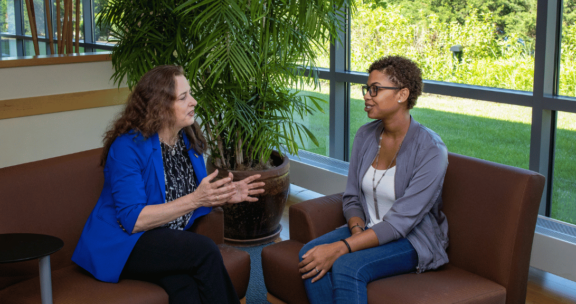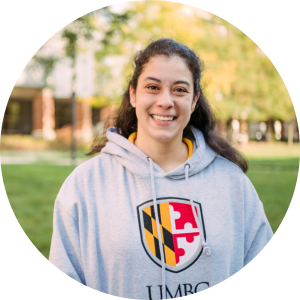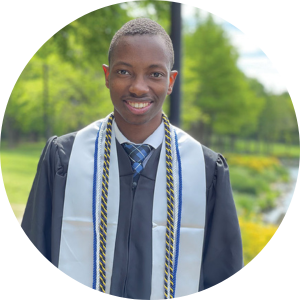
Not sure where to start? Request your viewbook!
Browse Events or Watch a Virtual Info Session
Ready to take the next step? Sign up for pre-transfer advising.
Psychology
Apply For ProgramFast Facts
- Top 150 psychology programs in the U.S.
- Organizes courses into six domains so you can customize your degree
- Prepares you for a variety of careers and/or graduate school
Introduction
Earn your bachelor’s degree in psychology at UMBC-Shady Grove to extend beyond the classroom and prepare for your future. Our unique model helps you save on tuition while earning the same UMBC degree as four-year students. You’ll graduate with analytic and interpersonal skills that can translate into a wide range of careers.
UMBC’s psychology program is designed to give you both the flexibility and guidance to find your path. You’ll be encouraged to engage in research and internships as an undergraduate. You can also get involved on campus through student organizations like the Psychology Student Association.
Steps to Your Degree
Before Transfer
The psychology department strongly encourages you to complete the following prerequisites prior to transfer:
- Introduction to Psychology
- English Composition
- Statistics
It is also recommended that you complete as many of the following courses as possible before transfer. These courses are required for graduation from UMBC and most cannot be taken at UMBC-Shady Grove:
- 3 Arts and Humanities courses (from at least two different disciplines)
- 3 Social Science courses (from at least two different disciplines; Introduction to Psychology counts as 1 of 3 courses)
- College Algebra or Statistics
- 2 Science courses (at least one must have a lab component)
- World Language Intermediate-Level (consult advisor about exceptions)
If you are completing your associate degree at Montgomery College, we encourage you to follow our articulation agreement. This agreement outlines the exact courses you should take to prepare for transfer: General Studies, A.A., SSAH / Psychology, B.A.
You can also review our Recommended Transfer Coursework for UMBC-Shady Grove’s B.A. in Psychology.
All students are strongly encouraged to complete pre-transfer advising before joining us at UMBC-Shady Grove. Explore pre-transfer advising options.
Admitted and current students should visit our advising FAQs.
Degree Requirements
UMBC Graduation Requirements
- Minimum of 120 academic credits
- Minimum of 2.0 GPA
- 45 upper-level (300 & 400-level) credits
UMBC-Shady Grove offers a minor in psychology.
More About the Program
If you’re interested in graduate school, UMBC’s Accelerated Bachelor’s/Master’s program can help you save time and money by allowing you to enroll in graduate-level courses in industrial-organizational psychology as an undergraduate. These courses can be applied to your bachelor’s and master’s degree or graduate certificate at UMBC-Shady Grove.
 Laura Rose, Ph.D.
Laura Rose, Ph.D.
Associate Teaching Professor and Director for the Psychology Program at The Universities at Shady Grove
Email: laurose1@umbc.edu
Office: Building III, Room 4155
Undergraduate Courses: PSYC 305 Children with Exceptionalities, PSYC 309 Psychology: Exploring the Discipline and Careers, PSYC 331 Experimental Psychology: Design and Analysis I, PSYC 332 Experimental Psychology: Design and Analysis II, PSYC 400 Seminar in Developmental Psychology, PSYC 407 Advanced Child Psychology
Dr. Laura Rose is an alum of UMBC’s Applied Developmental Psychology Ph.D. program and holds an M.A. in Counseling Psychology from Boston College. She has served as a faculty member in UMBC’s Psychology Department since 2014, including leadership roles as Director of the Undergraduate Psychology Program on the Catonsville campus and currently as Associate Chair. Dr. Rose is excited to begin as Director of the Psychology Program at UMBC at the Universities at Shady Grove, fostering connections between students and faculty and supporting initiatives that promote student success and engagement.
 Dr. Diane L. Alonso
Dr. Diane L. Alonso
Teaching Professor
Phone: 443-612-1318
Email: dalonso@umbc.edu
Office: Building III, Room 4145
Undergraduate Courses: PSYC 311 Research Methods in Psychology I, PSYC 312 Research Methods in Psychology I, PSYC 317 Cognitive Psychology, PSYC 331 Experimental Psychology: Design and Analysis I, PSYC 332 Experimental Psychology: Design and Analysis II, PSYC 370 Sensation and Perception, PSYC 393 Special Topics in Psychology: Perspectives in Forensics, PSYC 393 Special Topics in Psychology: Group Work, PSYC 415 Seminar in Cognitive Psychology, PSYC 670 Industrial-Organizational Psychology
With a background in Cognitive Psychology as well as educational and practical experience in Computer Science/Human Factors, Dr. Alonso’s interests involve the merging of technology, teamwork, and education. Focus areas include studying the effective use of technology in the classroom and looking at mechanisms to promote interdisciplinary, inter-institutional, and inter-professional experiences in education.
 Dr. Shariece Evans
Dr. Shariece Evans
Assistant Teaching Professor
Phone: 240-665-6476
Email: shariece.evans@umbc.edu
Office: Building III, Room 4143
Undergraduate Courses: PSYC 309 Psychology: Exploration of the Discipline and Careers,
PSYC 311 Research Methods in Psychology I, PSYC 312 Research Methods in Psychology II
 Dr. Donald Knight
Dr. Donald Knight
Assistant Teaching Professor
Phone: 301-738-6221
Email: dknigh1@umbc.edu
Office: Bldg. III, Room 4149
Undergraduate Courses: PSYC 309 Psychology: Exploration of the Discipline and Careers, PSYC 320 Psychological Assessments, PSYC 345 Introduction to Clinical Psychology and Psychotherapy
Dr. Robin Goldstein
Adjunct I
Email: go@umbc.edu
Phone: 301-922-5479
Undergraduate Courses: PSYC 409 Development and Education, PSYC 308 Child Maltreatment, PSYC 304 Adolescent Psychology, PSYC 407 Advanced Child Psychology, PSYC 382 Adolescent Psychopathology, PSYC 330 Child Development and Culture
I am an experienced educator and author with a career spanning over three decades. I have also been a faculty member at Johns Hopkins University, the University of Maryland Global Campus, and Montgomery College, specializing in subjects that include psychology, counseling, and child development.
 Dr. Diane Graves
Dr. Diane Graves
Adjunct I
Email: drgraves@umbc.edu
Undergraduate Courses: PSYC 304 Adolescent Psychology, PSYC 407 Advanced Child Development
Dr. Graves is a child clinical psychologist with expertise in working with youth and their families. Her research focus is the psychosocial well-being of adolescents making the transition from high school to college.
Dr. Aaron Hunt
Adjunct I
Email: ahunt8@umbc.edu
Undergraduate Courses: PSYC 330 Child Development and Culture, PSYC 356 Psychology of Sex and Gender
 Dr. Henry Khachaturian
Dr. Henry Khachaturian
Adjunct I
Email: hk@umbc.edu
Undergraduate Courses: PSYC 335 Physiological Psychology, PSYC 375 Neuroanatomy
Dr. Khachaturian is a neuroscientist that has retired from the National Institutes of Health and now teaches at UMBC (Psychology) and UMB (School of Medicine).
 Dr. Emily Lichvar
Dr. Emily Lichvar
Adjunct II
Email: elichvar@umbc.edu
Undergraduate Courses: PSYC 306 Lifespan Human Development, PSYC 307 Psychology of Aging
Dr. Lichvar is a developmental psychologist and has served as adjunct faculty in the Department of Psychology at USG UMBC since 2015. Dr. Lichvar works for the federal government in the area of children’s mental health.
Dr. David Banks
Adjunct III
Email: drbanks@umbc.edu
Undergraduate Courses: PSYC 387 Community Psychology, PSYC 385 Health Psychology, PSYC 441 Social/Health Psychology
Dr. David Banks has worked as a nurse, social worker, and professor.
Program News and Highlights
Alumni Spotlight

Psychology
Drama Therapy Master's Student at Lesley University in Cambridge, Massachusetts
Lexi's Story
Psychology
"UMBC has helped me to grow so much, not only as a student but also as a leader."
Ciomara's Story
Psychology
PhD student at Portland State University, Junior Associate at Jernigan & Associates
Hear from HenriB.S./B.A. in Psychology Information Request